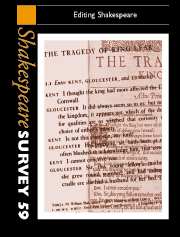Book contents
- Frontmatter
- Editing Shakespeare’s Plays in the Twentieth Century
- Crisis in Editing?
- On Being a General Editor
- Altering the Letter of Twelfth Night: ‘Some are born great’ and the Missing Signature
- ‘A Thousand Shylocks’: Orson Welles and The Merchant of Venice
- The Date and Authorship of Hand D’s Contribution to Sir Thomas More: Evidence from ‘Literature Online’
- Ferdinand’s Wife and Prospero’s Wise
- Editing Stefano’s Book
- Manuscript, Print and the Authentic Shakespeare: The Ireland Forgeries Again
- The Author, the Editor and the Translator: William Shakespeare, Alexander Chalmers and Sándor Petofi or the Nature of a Romantic Edition
- Women Edit Shakespeare
- The Shakespeare Edition in Industrial Capitalism
- Print and Electronic Editions Inspired by the New Variorum Hamlet Project
- The Evolution of Online Editing: Where Will it End?
- The Director as Shakespeare Editor
- The Editor as Translator
- Performance Editions, Editing and Editors
- Editing Collaborative Drama
- Will in the Universe: Shakespeare’s Sonnets, Plato’s Symposium, Alchemy and Renaissance Neoplatonism
- Giants and Enemies of God: The Relationship between Caliban and Prospero from the Perspective of Insular Literary Tradition
- Shakespeare’s Ages
- Who Wrote William Basse’s ‘Elegy on Shakespeare’?: Rediscovering a Poem Lost from the Donne Canon
- ‘Sometime a Paradox’: Shakespeare, Diderot and the Problem of Character
- Shakespeare Performances in England, 2005
- Professional Shakespeare Productions in the British Isles, January–December 2004
- The Year's Contributions to Shakespearian Study 1 Critical Studies
- 2 Shakespeare in Performance
- 3 Editions and Textual Studies
- Index
Manuscript, Print and the Authentic Shakespeare: The Ireland Forgeries Again
Published online by Cambridge University Press: 28 March 2007
- Frontmatter
- Editing Shakespeare’s Plays in the Twentieth Century
- Crisis in Editing?
- On Being a General Editor
- Altering the Letter of Twelfth Night: ‘Some are born great’ and the Missing Signature
- ‘A Thousand Shylocks’: Orson Welles and The Merchant of Venice
- The Date and Authorship of Hand D’s Contribution to Sir Thomas More: Evidence from ‘Literature Online’
- Ferdinand’s Wife and Prospero’s Wise
- Editing Stefano’s Book
- Manuscript, Print and the Authentic Shakespeare: The Ireland Forgeries Again
- The Author, the Editor and the Translator: William Shakespeare, Alexander Chalmers and Sándor Petofi or the Nature of a Romantic Edition
- Women Edit Shakespeare
- The Shakespeare Edition in Industrial Capitalism
- Print and Electronic Editions Inspired by the New Variorum Hamlet Project
- The Evolution of Online Editing: Where Will it End?
- The Director as Shakespeare Editor
- The Editor as Translator
- Performance Editions, Editing and Editors
- Editing Collaborative Drama
- Will in the Universe: Shakespeare’s Sonnets, Plato’s Symposium, Alchemy and Renaissance Neoplatonism
- Giants and Enemies of God: The Relationship between Caliban and Prospero from the Perspective of Insular Literary Tradition
- Shakespeare’s Ages
- Who Wrote William Basse’s ‘Elegy on Shakespeare’?: Rediscovering a Poem Lost from the Donne Canon
- ‘Sometime a Paradox’: Shakespeare, Diderot and the Problem of Character
- Shakespeare Performances in England, 2005
- Professional Shakespeare Productions in the British Isles, January–December 2004
- The Year's Contributions to Shakespearian Study 1 Critical Studies
- 2 Shakespeare in Performance
- 3 Editions and Textual Studies
- Index
Summary
Where do we locate the authentic Shakespeare? This was the question asked, rather less bluntly, by Stephen Orgel in his influential Representations essay of 1988. Taking and testing Shakespearian examples in manuscript, in print, in the theatre and in portraiture, Orgel asked how the category of the authentic varied historically in, and was varied historically by, these different but clearly related contexts. Orgel argued that although these locations can perform authenticity they cannot themselves be authentic; despite their variety, Shakespearian authenticity oddly still exists elsewhere:
What is authentic here is something that is not in the text; it is something behind it and beyond it that the text is presumed to represent: the real life of the characters, the actual history of which the action is a part, the playwright’s imagination, or the hand of the master, the authentic witness of Shakespeare’s own history. The assumption is that texts are representations or embodiments of something else, and that it is that something else which the performer or editor undertakes to reveal. What we want is not the authentic play, with its unstable, infinitely revisable script, but an authentic Shakespeare, to whom every generation’s version of a classic drama may be ascribed.
What we want, as Orgel put it, others have wanted also; and this article explores an earlier version of those desires for Shakespearian authenticity: the Shakespeare forgeries of William-Henry Ireland. The story of those forgeries has been often told, and the narrative of the young William-Henry Ireland’s ‘discovery’ of a trunk of papers containing not only Shakespeare’s long-lost correspondence with Queen Elizabeth, Lord Southampton, Richard Burbage and others, but also manuscripts of King Lear and Hamlet, with, to top it all, two ‘lost’ plays, Vortigern and Henry II, does not need retelling here. Rather my argument focuses on the relation between the forgeries and their most devastating exposure, Edmond Malone’s An Inquiry into the Authenticity of Certain Miscellaneous Papers and Legal Instruments (1796).
- Type
- Chapter
- Information
- Shakespeare Survey , pp. 108 - 123Publisher: Cambridge University PressPrint publication year: 2006

